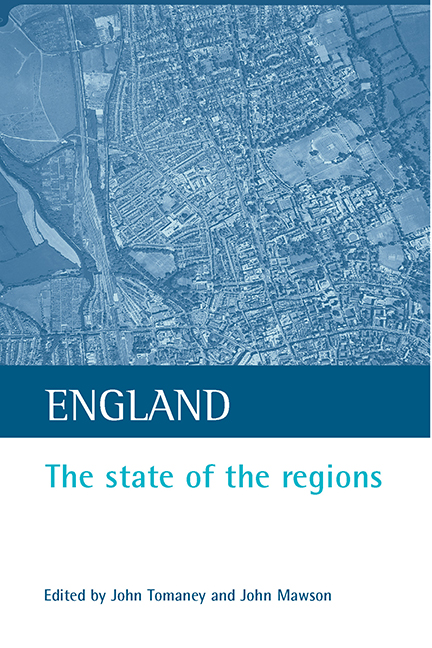Book contents
- Frontmatter
- Contents
- List of tables and figures
- Acknowledgements
- List of contributors
- one Introduction
- two Regional government in England: reviewing the evidence base
- three New Labour and the evolution of regionalism in England
- four Yorkshire (and the Humber)
- five Institutional collaboration in the West Midlands region
- six England's North West
- seven The South West
- eight Regionalism in the East of England
- nine The South East region?
- ten Regionalism in North East England
- eleven Regional strategy development in the East Midlands
- twelve The problem of regional governance
- thirteen Elected regional government: the issues
- fourteen Barnett plus needs: the regional spending challenge in Britain
- fifteen Conclusion: prospects for regionalism
- Index
- Also available from The Policy Press
eight - Regionalism in the East of England
Published online by Cambridge University Press: 20 January 2022
- Frontmatter
- Contents
- List of tables and figures
- Acknowledgements
- List of contributors
- one Introduction
- two Regional government in England: reviewing the evidence base
- three New Labour and the evolution of regionalism in England
- four Yorkshire (and the Humber)
- five Institutional collaboration in the West Midlands region
- six England's North West
- seven The South West
- eight Regionalism in the East of England
- nine The South East region?
- ten Regionalism in North East England
- eleven Regional strategy development in the East Midlands
- twelve The problem of regional governance
- thirteen Elected regional government: the issues
- fourteen Barnett plus needs: the regional spending challenge in Britain
- fifteen Conclusion: prospects for regionalism
- Index
- Also available from The Policy Press
Summary
The East of England and recent institution building
The region in context
The East of England is a relatively new geographical construct. Its geography results from the merging of the East Anglia standard planning region (which comprised the counties of Norfolk, Suffolk and Cambridgeshire) with the counties of Essex, Hertfordshire and Bedfordshire, that formerly made up part of the South East Regional Planning (SERPLAN) region. Together, the six counties of the East of England have been among the fastest growing in terms of population and economic activity in the UK. In per capita terms, the output of the region ranks 35th out of 77 regions in the European Union (EU) – a position higher than all other UK regions, apart from London and the South East. Between 1993 and 1998, the economy of the region grew by 3.5% per annum compared with the UK average rate of 2.5%, and the official rate of unemployment for the region in 1999 was 3.5% compared to a national figure of 4.8% (Townroe and Moore, 1999). Prosperity has been both followed and driven by strong population growth since the 1960s. The current population of some 5.3 million residents has grown as a result of marked net in-migration, with net population growth in the region of 9.0% between 1981 and 1996.
The region's economic and industrial structure resembles that of the UK as a whole. Although East Anglia in particular has an image as a rural and agricultural region, only 2.1% of the East of England's workforce are employed in agriculture, fishing and forestry, and the proportion employed in manufacturing closely matches the national average of 18.2%. The manufacturing sector is characterised by a relatively large proportion of medium-sized companies and a high rate of growth in new companies. In contrast to the rural character of Norfolk and Suffolk, the regional economy of the East of England is being increasingly represented as hi-tech. The region has the highest research and development employment per capita of all UK regions – not least as a result of the influence of Cambridge – and has strengths in electronics, telecommunications and biotechnology sectors.
- Type
- Chapter
- Information
- EnglandThe State of the Regions, pp. 109 - 124Publisher: Bristol University PressPrint publication year: 2002



